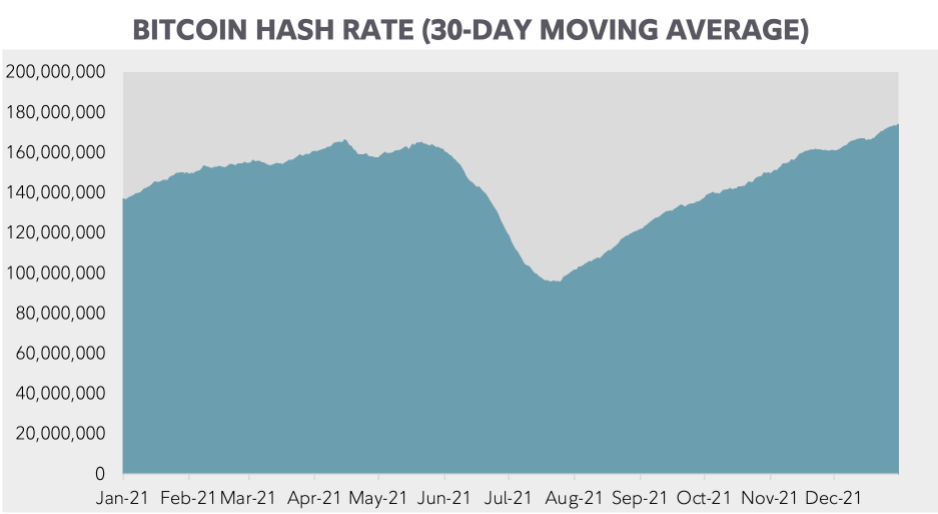China’s crackdown on Proof-of-Work mining last year tested the security of the Bitcoin network and showed that it was far more resilient than once thought.
Analysts expected that it would take more than a year for Bitcoin’s hash rate to recover, but the network managed to rebound in less than a month.
The mining ban in China has made Bitcoin more resilient than ever
The Bitcoin network took its hardest hit in May last year when several provinces in China began implementing policies designed to shut down Proof-of-Stake mining. Citing environmental concerns and energy-producing thresholds, the policies managed to push out almost all Bitcoin mining operations and most crypto companies from the country.
With over 75% of Bitcoin mining located in China, the bans caused panic in the industry as many believed the network would suffer a devastating blow were they to be implemented.
The network took a serious blow—losing over 40% of its hash rate between May and July of 2021—but it managed to recover faster than anyone has thought.

Many analysts expected it would take well over a year for the hash rate to reach its previous highs, as all of China’s massive mining operations had to be packed up and moved. Those that fail to relocate were expected to sell off their hardware, creating even more pressure on the network.
However, the network rebounded in less than a month and kept the growing trend throughout 2021. In December last year, the 30-day hash rate stood at 5% over the year’s previous high.
In its 2021 Digital Asset Recap, Fidelity Investments noted that China’s ban removed a major investment and operational risk to Bitcoin—the potential of a nation-state attack on the network.
“Because as much as 75% of the network’s computing power was previously located in China, there was in our opinion a credible threat to China taking control of a majority of this power and therefore the potential to gain over 50% of the network’s power,” Fidelity noted in the report.
And while there was little evidence to suggest that this was China’s intention, the fact that all of the mining operations have moved from the country shows that this will not happen in the future.
This is due to the fact that China’s ban has forced miners to distribute their operations around the world, making Bitcoin’s hash rate more decentralized than ever.
Finally, Fidelity’s most important takeaway from the report is that the mass migration of miners will have a profound positive impact on Bitcoin. Moving large mining operations overseas is a very expensive endeavor and the fact that it’s been done on such a large scale shows that the miners are making investments in the long haul instead of looking for a quick profit.
And this is what has and will continue to strengthen the resiliency and reliability of the Bitcoin network, Fidelity concluded.
CryptoSlate Newsletter
Featuring a summary of the most important daily stories in the world of crypto, DeFi, NFTs and more.
Get an edge on the cryptoasset market
Access more crypto insights and context in every article as a paid member of CryptoSlate Edge.
On-chain analysis
Price snapshots
More context
Join now for $19/month Explore all benefits
Credit: Source link






















 Bitcoin
Bitcoin  Ethereum
Ethereum  XRP
XRP  Tether
Tether  Solana
Solana  USDC
USDC  Dogecoin
Dogecoin  Cardano
Cardano  Lido Staked Ether
Lido Staked Ether  TRON
TRON  Wrapped Bitcoin
Wrapped Bitcoin  Wrapped stETH
Wrapped stETH  Chainlink
Chainlink  Avalanche
Avalanche  Sui
Sui  Stellar
Stellar  Litecoin
Litecoin  Shiba Inu
Shiba Inu  Toncoin
Toncoin  Hedera
Hedera  LEO Token
LEO Token  USDS
USDS  Hyperliquid
Hyperliquid  WETH
WETH  Polkadot
Polkadot  MANTRA
MANTRA  Bitcoin Cash
Bitcoin Cash  Bitget Token
Bitget Token  Ethena USDe
Ethena USDe  Wrapped eETH
Wrapped eETH  Uniswap
Uniswap  Monero
Monero  NEAR Protocol
NEAR Protocol  Pepe
Pepe  WhiteBIT Coin
WhiteBIT Coin  Aave
Aave  Ondo
Ondo  Bittensor
Bittensor  Aptos
Aptos  Internet Computer
Internet Computer  Dai
Dai  Official Trump
Official Trump  Ethereum Classic
Ethereum Classic  Tokenize Xchange
Tokenize Xchange  Mantle
Mantle  OKB
OKB  Gate
Gate  sUSDS
sUSDS  Coinbase Wrapped BTC
Coinbase Wrapped BTC 
